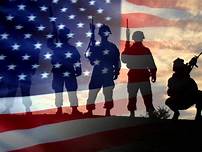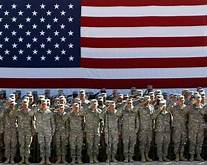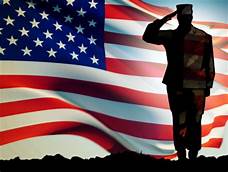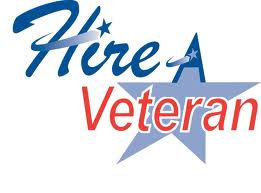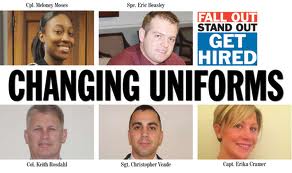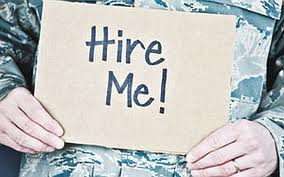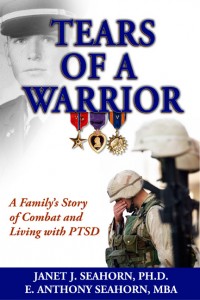Dec
28
GETTING THROUGH THE HOLIDAY SEASON
Filed Under American Patriotism, Bless Our Troops, Christmas, Events, Family, Happy New Year, Healing, Military, New Year, PTSD, Tears of a Warrior, Troops, Veterans, War | Comments Off on GETTING THROUGH THE HOLIDAY SEASON
Guest post by Lisa Drossert
The following was on one of our friend’s Facebook post. It is very thoughtful advice and may help some of you to get through the holiday season with better understanding of what is going on in some veterans’ mind. Thank you Lisa Drossart for sharing this information.
If you have a Combat Veteran in your family and you don’t like their moods and behavior around the holidays; please consider these six things:
1.) Your combat veteran has served in countries where people are blessed to receive a tattered pair of shoes or have clean water to drink; he/she no longer lives the “first world illusion” and no longer cares that if you buy one play station you can get a second one for fifty percent off. In fact, they find it hard to appreciate any of the gluttonous commercialism and overindulgence that permeates American holidays. Standing watch, boring as it was, had so much more purpose than going to the mall.
2.) Your Combat Veteran is thankful for the most basic things; not thankful for mega-sales and million dollar parades. They are thankful to be alive; thankful to have survived both the wars far away and the wars they struggle with inside.
3.) Your Combat Veteran is thankful that it wasn’t them that got killed, or wishes that it was them that got killed instead, or is torn painfully between the two. Either way, their celebrations are forever complicated by guilt and loss over those that did not come home. Some of the most thankful times in their life (lucky to be alive) were some of the scariest. Their feelings of thanks and celebration often conjure memories that are equally painful.
4.) Your Combat Veteran is not like you anymore. At some point, for some period of time, their entire life boiled down to just three simple things: when will I eat today, when will I sleep today, and who will I have to kill or who will try to kill me today? They are not like you anymore.
5.) Your Combat Veteran does not need a guilt-trip or a lecture; they already feel detached in their grief while others so easily embrace the joy of the season. They need understanding and space; empathy not sympathy.
6.) Your Combat Veteran does love his/her family and is thankful for the many blessings in their life…and they are thankful for you.
Mar
18
How you can honor our Vietnam vets
Filed Under Combat PTSD, Peace, PTSD, Tears of a Warrior, Troops, Veterans, Vietnam Veterans, War | Comments Off on How you can honor our Vietnam vets
Ann McFeatters: How you can honor our Vietnam vets
Guest Post from the Dallas Morning News:
By ANN MCFEATTERS
Published: 05 March 2015 07:27 PM
The man who said his name was Danny arrived at my door with a huge floral box. Inside was one of the most beautiful bouquets I’d ever seen.
Danny was with the Maryland highway department, supervising a crew installing new curbs on my street. He was also a Vietnam veteran who had seen the small blue star in my window, indicating two family members were serving in Iraq and Afghanistan.
Danny came from a generation that provided 9.2 million people who served in the military during the Vietnam era, many of whom came home from war reviled, not thanked for what they gave their country. Like most of his fellow veterans, Danny vowed to show only gratitude to those in military service, no matter what the politics of any current war that service members are called on to fight. Flowers to a stranger were to thank my family.
This month marks the 50th anniversary of the arrival of 3,500 Marines in Da Nang, South Vietnam, beginning 10 years of a terrible conflict that would sear and scar this nation.
In the “lessons learned” department, perhaps the most important is to separate the warrior from the war. Today Americans of all political stripes express sincere appreciation for what the men and women of the armed forces are called on to do for their country, whether the mission is popular or not.
The Vietnam Veterans Memorial on the mall in the nation’s capital, with its awesome wall designed by Maya Lin, engraved with the names of 58,300 people who gave their lives in the jungles of Southeast Asia, was meant as one way toward healing a divided, bitter country.
It has worked. The three-acre memorial with its gardens, wall, Vietnam Women’s Memorial and The Three Servicemen statue, is visited by 4.5 million people a year. Its website, with photos and information on veterans and messages from their friends and families, draws 4 million virtual visitors annually.
The veteran behind the memorial, Jan Scruggs, a man of enormous personality and drive who raised the $8 million needed to begin implementation of it, is retiring this year.
One way the Vietnam Veterans Memorial Fund plans to honor him and all the war’s veterans is to raise money for a $116 million underground education center to display some of the 400,000 personal items left at the wall by visitors, a unique occurrence which stunned the memorial’s founders.
From teddy bears to tear-stained letters, the items, stored in boxes maintained by the National Park Service, which owns the memorial, tell powerful stories.
Approved by Congress with no funding, the education center needs donations from the public if it is to be ready for a ribbon-cutting ceremony in 2020. Most of all, the Vietnam Veterans Memorial Fund wants future generations to learn about the Vietnam era, how decisions were made and what they meant to the nation.
Tomorrow’s fifth-graders must learn they owe a debt to those who came before them and that they, too, must leave a legacy of service, the best way they are able. Technology will give them access to such things as digital oral histories from veterans and TV footage of the first war played out in the nation’s living rooms.
There are 7 million living Vietnam War veterans. Beyond those who died or went missing there, Vietnam veterans are still dying of injuries sustained in the war, such as exposure to Agent Orange and post-traumatic stress disorder. The fund’s CEO, Jim Knotts, a Desert Storm veteran, stresses that these veterans must be honored, and that good health care for all veterans must be a national priority.
Because of space restrictions, the education center will be the last major memorial built on the National Mall. Fifty years after the start of the Vietnam War, it is time to take the next step in honoring those who fought it, whether they wanted to or not.
Here’s to you, Danny, and all those like you.
Aug
14
WHEN NEEDED, CHOOSE PERSISTENCE
Filed Under Tears of a Warrior, Troops, War | Comments Off on WHEN NEEDED, CHOOSE PERSISTENCE
by Janet J. Seahorn, Ph.D
What is it that keeps someone going when everyone else seems to be giving up? We hear about such individuals on television, read about them in magazines, and if we are really lucky, we even know a few personally. When trying to put together some common traits of these resolute beings, it is interesting to see what it is that keeps them going.
For some it is religion; a deep faith in a higher source that is walking the journey of a demanding life with them. For others it is more about spirit than religion – spirit being defined as the vital force that characterizes a human being as being alive or a sense of self and energy. Yet, for many it is as simple as living for a cause that is greater than the personal comfort of the self. The vast amount of veterans we have been around have a profound abundance of this trait. Perhaps living beyond oneself came as a result of serving their country even when it meant the possibility of death, bodily injuries, and emotional distress.
In combat, soldiers woke up every morning to face a foe that was ever present. Seeing the price of war and dealing daily with personal losses was a constant of their battle experience. There was no such thing as giving-up or giving-in because it meant that it would let their fellow troops down.
Perhaps the greatest battle for many is when they return home. The challenge of trying to reintegrate into a community which has essentially been isolated from war. Families, spouses, children, friends, coworker – most are truly grateful for the warrior’s sacrifice. We try to understand, to be patient and encouraging, yet, there is absolutely no way any of us who have not been in a combat situation can fully comprehend such devastating experiences.
Therefore, choosing persistence is an option that allows the person to move forward. It is a choice that the vet must make every day. It is a choice that spouses, children, families, and friends must make every day. And it is a choice that Winston Churchill proposed in his statement… “Never give in, never, never, never — in nothing, great or small —- never give in except to convictions of honor and good sense.”
And this is the true essence of persistence. And last, a very special quote from Winnie the Pooh,
Promise me you’ll always remember: You are braver than you believe,
And Stronger than you seem,
And smarter than you think.
(A.A. Milne)
Feb
2
VETS, JOBS AND MISCONCEPTIONS
Filed Under Tears, Tears of a Warrior, Troops, Veterans, War | Comments Off on VETS, JOBS AND MISCONCEPTIONS
by Janet J. Seahorn, Ph.D
Recently, Tony and I visited with a group of veterans from the Military Order of Purple Heart. Attending were vets from WWII, Korea, Vietnam and the current conflicts. While discussing our book, Tears of a Warrior and the issues of PTSD, we got on the topic of how challenging it is for veterans returning from war to find a job. Only in recent times has the issue of work for veterans become clearer.
Many of us thought veterans who came home from serving in WWII were greeted with big parades and wonderful new career opportunities. For years I was under such an assumption. Then I talked with several WWII veterans and what they described was something much simpler. For most, once they returned home they did what historically other veterans had done before them… they went home, tried to find a suitable job and raise a family. Little was written or said about the struggle in finding employment or integrating back into civilian life. For many, there were no parades, no bands welcoming them home, only the test of getting on with life.
Eric Jensen explains in his book about his father, Forever and a Day: The World War II Odyssey of an American Family, how hard it was to find work after the war. As he wrote, many of the jobs were already filled by civilians who had those positions during the war. When the veterans returned there were not as many opportunities for employment as we first believed. Jensen wrote how frustrating it was for his father to have spent so many years away from his family only to return to another struggle – finding a job that would pay enough to support his young family.
Today, too many employers believe erroneously that vets returning from Iraq and Afghanistan may be suffering from PTSD or TBI and are reluctant to hire someone who may be emotionally compromised. We have written on several occasions how this is simply not the case for the majority of combat personnel. Military personnel have proven over and over again that they are bright, committed and competent employees. Given a task, they will make sure it gets completed in a satisfactory manner. They will show up daily, even when they are tired or under the weather. Veterans are some of the most proficient and capable members of an organization.
Part of the healing process of our soldiers, both young and old is to value their sacrifice for our country by honoring them with suitable jobs. One struggle we can help them avoid is a struggle to find work. As a country and as a community perhaps offering employment can be a step of vast significance.
In addition to mending them, “If we send them, let’s then employ them” when they return.
Nov
1
Tribute To A Soldier
Filed Under Combat PTSD, Presidential Unit Award, PTSD, Tears of a Warrior, Tribute, Troops, Veterans, War, World War II | Comments Off on Tribute To A Soldier
by Deborah A Maffucci
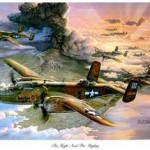 This blog was sent via an e-mail letter last week. Deborah has kindly allowed us to share her comments with our readers.
This blog was sent via an e-mail letter last week. Deborah has kindly allowed us to share her comments with our readers.
Growing up, my knowledge of my dad’s war experience went no further than, “My dad was in WW II and I think he was stationed in England.”
On advice from my therapist, I decided to go to the attic and find my dad’s discharge papers. Oh my!!! After hours of online research (which is amazingly complete) for the first time I realized that my dad was right in the “thick of WWII”
He was 22 years old in 1942 when he joined the USAAF to fight in the European Theatre in WW II. He received four medals and a Presidential Unit Citation. He was at Normandy, the Battle of the Bulge and Rhineland. He was a Technical Sgt. in the 8th Air Force Fighter Command, 66th Fighter Wing, 339th Fighter Group, 504th Fighting Squadron. Oh my stars !!! He was a soldier.
I needed to read about what it is really like to be a soldier. I found your book, “Tears of a Warrior” at my local library and read it almost in one sitting. I couldn’t put it down. A whole world of understanding and compassion for my dad has been felt in my heart. A sense of awakening and belief that I will feel much more true joy and happiness and conquer my life long feelings of anxiety, fear and depression.
I realize now that I am trying to heal from the secondary PTSD that comes from living with a combat warrior and not knowing it. There was no time for my dad to heal because he died in 1969 from cancer. I realize my dad’s war experiences must have been the true source of our family struggle. It wasn’t because my dad didn’t love us, or because he would rather spend all his time at the firehouse, the VFW or the Elks Club, he was a warrior. I understand why he loved being a fireman, he was draw to the danger, why he abused alcohol, to block out his war memories, why he yelled so much, he was a sergeant. All my childhood memories make sense now. Your book has put my life story in prospective. Thank you for that long awaited insight. !!!
My dad was a combat warrior and I never knew it. I just want to give him the biggest hug right now and tell him how proud I am of him. From 1945 until Dec 7th 1969 when he died, he was fighting WWII in his mind and body.
You have truly helped me to understand what happened to my dad in the war and what he must have struggled with after the war. I hold him in a new and special place in my heart.
God bless you,
Debbie Maffucci
P.S. I borrowed your book from the Jesup Library in Bar Harbor, Maine. I believe it was only hours after you so graciously donated a copy to our town. I have recommended it to my counselor to use in her therapy work.
Oct
15
DOES ANYONE CARE?
Filed Under American Patriotism, Tears of a Warrior, Today's War, Trauma, Troops, Veterans, War | Comments Off on DOES ANYONE CARE?
by Janet J. Seahorn, Ph.D
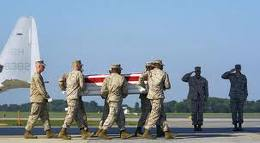
It’s been on the news and in the papers – the latest studies about our military personnel serving in Iraq and Afghanistan.
The studies done by the Pew Research Center were based on two surveys between July and September (Denver Post, Oct. 6, 2011). One survey focused on military individuals who are currently on active duty along with those who have served but are no longer active. The second survey polled over 2000 adults who had never been in the military.
What disturbed me most however was not the report that many of our troops are either “ambivalent” or do not feel the current wars in Iraq and Afghanistan were “worth the sacrifices”. Nope, what was most unsettling for me was that adults polled who had never served in the military did not give much thought to those serving in combat. Many felt that those who volunteered to serve their country knew what they were getting into.
- 84 percent of these modern-era warriors say the general American public has little or no understanding of the problems they face, with 71 percent of the public agreeing.
- Many Americans agree that since the terror attacks in the U.S., the military and their families have made more sacrifices than the general public. But even among this group, only 26 percent say this gap is “unfair,” while 70 percent say that it’s “just part of being in the military”. (msnbc.com staff and news service reports updated 10/5/2011 5:50:40 AM ET 2011-10-05T09:50:40)
I guess this last research bullet just didn’t sit well with me. Probably because as a family we have lived the aftermath of combat, lived with the ghosts of the dead and dying, and had to cope with the nightmares, anxiety attacks, and flashback memories. It isn’t that any vet or his/her family wants empathy for his/her service, but to read that 70% believe that “it’s just part of being in the military” seems like a really insensitive statement.
I am not sure that any person, young or old, has a true idea of what war and combat is about. I am pretty sure, on the other hand, that none of them had any clue that what they do, see, and experience in hell will stay with them for a lifetime. That the war they fought on foreign soils will follow them home and into their living rooms, relationships, and careers. Few of them had any clue that these things were “just part of being in the military”.
Perhaps, since Vietnam, too many Americans have been too far removed from the sacrifices of war. During WWII everyone on the home front had to give up something for the war. Now, most give up nothing, while those few who serve give up far too much. The very least we at home can do is give two or three minutes each day to say a short prayer for those and their families who serve. Just remembering our military will certainly make us, not merely better people, but a more thoughtful, compassionate nation.
Jun
30
“Remember Me”
Filed Under American Patriotism, Family, Fourth of July, Tears of a Warrior, Troops, Veterans, War | Comments Off on “Remember Me”


